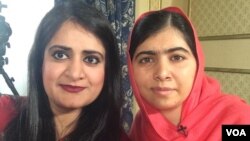Malala Yousafzai made history Wednesday as the youngest Nobel Prize laureate, sharing the peace award with a fellow champion for children's rights, Kailash Satyarthi. VOA reporter Madeeha Anwer traveled to Oslo, Norway, for an exclusive interview with Malala.
Madeeha Anwer, VOA: "You are going to receive a very prestigious award, the Nobel Peace Prize. What are you feeling on this occasion?"
Malala Yousafzai: "I am delighted and it is a matter of pride for the whole nation that we have been awarded this prize for peace, because in the world we have a reputation of being terrorists. This peace award conveys a very important message about us - that Pakistanis want peace and they support education."
VOA: "Big awards bring big responsibilities. Do you feel prepared for this responsibility?"
Malala: "I have been preparing myself for a long time - not for the Nobel Peace Prize responsibility but for the responsibility of working for my Pakistani society and for the education of children. With this distinction my responsibility has definitely increased. Now I have to work more to ensure that every child receives an education. I believe that Pakistan will progress only when Pakistani kids receive a higher education."
VOA: "In general, people in Pakistan are happy you are receiving the award. Still, as you know, there has been criticism from some, saying that perhaps you did not deserve this award. You are so young. What do you have to say in response?"
Malala: "I have a lot of experience. It has been almost seven or eight years since I started this campaign at the age of 10 or 11. So I have experienced both criticism and appreciation. It is part of life. Some criticism is good and you can learn from it. I believe that still, not all children are in school. If all of them were in the schools then they would not have given us this award. The reason for both Kailash Satyarthi and I being awarded this prize is that they wanted to encourage us to continue our work and strengthen our cause. Another purpose is to convey this message to the world leaders - that despite all the development and progress there are countries where not all children have access to education."
VOA: "We first knew you as little girl who used to write this diary with the pseudonym of Gul Makai. Did that little girl ever think that she would make this far?"
Malala: "Gul Makai was only telling what was going on in Sawat (Pakistan) - that there was terrorism, schools were being destroyed, boys’ rights were being usurped, girls could not go to schools. So she just described reality. She did not know where that would take her, but telling the truth is very important. What Gul Makai did is what I am still doing. Sometimes this reality is bitter, but you have to say it. If you do not then issues will not get resolved. If I don’t say that girls’ rights are being exploited then girls would never get equal rights. So Gul Makai is very happy because education, which she raised her voice for, is now being talked about by the whole world. Isn’t that a big achievement? When the world leaders decided on the Millennium Development Goals, they only focused on primary education. These countries that are not poor are saying only primary education is important, while for their own children they provide both secondary and higher education. For the children of poor countries they say only primary education is enough. So this is Gul Makai’s mission. First it was limited to Sawat, now it is for the whole world."
VOA: "People in Pakistan want to know when you will go back and continue your work on education."
Malala: "Very soon, God willing. Right now I am busy with my studies and exams. As soon as I have a break I will go back and serve my country. I still remember those girls in my neighborhood who were not in school. I used to be in uniform, but those girls were not. It felt like every passing day they were losing hope. I did not want them to lose hope. I wanted for those girls to get an education and contribute towards the progress of their country, too. Educating a child is not only good for that child, but it also helps to make the whole society civilized and progress."
VOA: "You have expressed your desire to become prime minister one day. Education and politics are two very different fields, so how did you come to this?"
Malala: "I wanted to work for my country and send every child to school. I thought about all the different fields and concluded that politics is the field through which one can serve the whole country. I think education and politics are related because in our country’s politics, some decisions about education were good on paper but never got implemented. I believe if you are a politician then you can not only make the right decisions, but also get them implemented. I hope that one day if people give me their vote and I become the prime minister, I will serve my country. However, it does not depend on politics alone.
Even if I do not become prime minister, I will still serve my country. Even if I become a prime minister one day, that is not going to happen before I am 35 or 40 years old. There is still plenty of time for that. My work, meanwhile, will continue.
